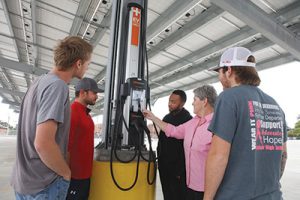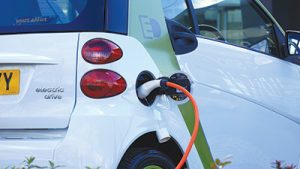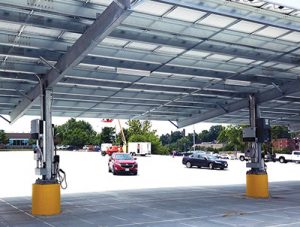IBEW/NECA Electrical Connection pioneers electric vehicle infrastructure training

In 2012, Dennis Gralike, director of the IBEW/NECA Electrical Industry Training Center, penned an op-ed in the St. Louis Post-Dispatch detailing a pioneering education program to serve the then emerging electric vehicle (EV) industry.
Last year, there were more than 1.1 million electric vehicles on the road in the United States, according to the Edison Electric Institute. And the International Energy Agency forecasts that the number of electric vehicles on the road around the world will hit 125 million by 2030.
The IBEW/NECA training center is operated jointly by the International Brotherhood of Electrical Workers (IBEW) Local 1 and the St. Louis Chapter of the National Electrical Contractors Association (NECA), which partner to form the Electrical Connection.
FIRST-OF-ITS-KIND TRAINING PROGRAM
The partnership’s first-of-its-kind Electric Vehicle Infrastructure Training Program (EVTIP) has been instrumental in supporting the growing EV industry and the hope of greater energy independence and environmental stewardship. Dr. Linda Little, assistant director of the training center, helped develop the EVITP national curriculum. She now is a member of the St. Louis Building Energy Improvement Board.

“The Electrical Connection’s involvement began more than 11 years ago in planning the EV curriculum and recruiting affirmation partners,” said Jim Curran, Electrical Connection executive vice president. “In 2011, key stakeholders in the EV industry –automakers, utility companies and charging station manufacturers – teamed with the electrical industry and the Electrical Connection IBEW/NECA partnership to develop training standards that would ensure reliable charging station installations. Those standards eventually became EVITP.
30 NECA CONTRACTORS, 400 IBEW ELECTRICIANS
In addition to the training, Article 625 of the National Electrical Code was developed to cover EV charging systems. To date, more than 30 Electrical Connection/NECA-member electrical contractors have completed EVITP training, as have more than 400 IBEW electricians.
EVITP ultimately helped establish the foundation of EV infrastructure in the home with fixed charging stations typically mounted to a garage wall. New home construction is witnessing an explosion of electric vehicle charging stations as standard options available to new home buyers
In the public sector, charging stations are growing at a rate of about 10 percent a year covering businesses, schools, rest stops, municipal and entertainment venues and more. EVITP has effectively addressed the more challenging issues in the public sector, including:
- Introducing more robust and reliable power supply to existing parking facilities.
- Engineering new construction projects to meet EV charging demands.
- Working with facility owners on intra-lot traffic flow, EV parking space signage, ADA compliance and how the overall configuration works for EV and non-EV drivers.

BIDIRECTIONAL CHARGING
“We are constantly adapting our curriculum to new EV technology,” Gralike said. “This includes bidirectional charging where EVs can send energy back to the grid as they are being charged. In some EV models, the car becomes a mobile battery pack with the capacity to store energy that can be used in the event of a natural disaster that causes a blackout.”
The Electrical Connection IBEW/NECA partnership represents more than 5,000 highly skilled and safe IBEW electricians and the more than 150 NECA electrical contractors who employ them. For more than 75 years, the IBEW/NECA Electrical Connection partnership has trained more electricians/communication technicians than any education program in Missouri. Its award-winning work provides safe and reliable electrical construction, maintenance, repair and replacement services across Missouri, the nation and the world. Learn more at electricalconnection.org.



Leave a Reply